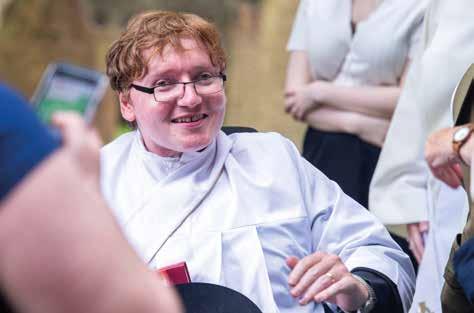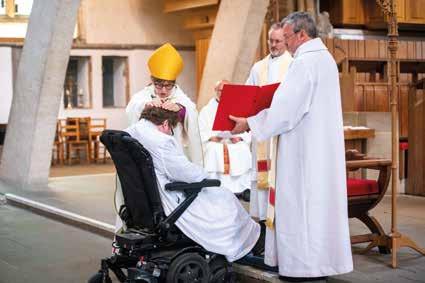
5 minute read
An Awkward Question
Why should a church seek to be inclusive and accessible? At first glance, this might seem like an odd question to ask. After all, the last thirty years or so (roughly my lifetime) have seen a dramatic change in social attitudes towards those with mobility impairments, such that adjustments are now considered de rigueur and their absence causes outraged comment on the part of complete strangers.
Moreover, it might seem churlish of one whose limitations are entirely mobilitybased to be posing the question: physical impairment like my own remains the most ‘acceptable’ form for people to consider.
(If you doubt that last statement, consider whether I’d have found the same level of welcome, adjustments, and acceptance as a cleric in the diocese – for which I am deeply grateful – if my condition involved speech difficulties or the need for aid in toileting myself.)
Finally, I have a bundle of other characteristics (some innate, some acquired) which – rightly or wrongly – incline others to take my voice and contribution seriously. In that sense, I am a poor representative of ‘the disabled’ as a socially marginalised and excluded group, too many of whom remain un- or under-employed, with fewer life chances, a poorer quality of life, and a lower life expectancy.
In summary, the question is unnecessary and I am the wrong person to ask it. Doubtless there are other people with disabilities who feel that I am letting the side down and that I am missing the opportunity here to offer a clarion call to ministry area councils across the diocese: could I come and lead worship in your church from my wheelchair? If not, why not?
Yet I want to be awkward and persist in asking the question. Perhaps a slight change in typography will help to illustrate why: why should a church seek to be inclusive and accessible?
The truth is that attitude change in churches has largely followed, if not actively lagged behind, the wider shift in society here. Occasionally, this seems to have been because of the persistence of eccentric theology: despite Jesus’ response to his disciples’ question (‘Rabbi, who sinned, this man or his parents, that he was born blind?’) at John 9.3 – ‘neither this man nor his parents sinned’ – there remain those who see a persistent link with sin. More often, however, pragmatism rather than theology was the reason: ‘we’d love to have x as part of our congregation but you see [listed status/money/the intractability of diocesan committees or officials/the health and safety implications – delete as required] makes it too difficult!’
This ought to strike us as an odd state of affairs. We ought, perhaps, to ask ourselves why it remains the case that I am guaranteed to find suitable toilet facilities at any and every branch of Wetherspoons but am taking a serious gamble with my personal dignity if I turn up urgently expecting to find them in a Church in Wales church or cathedral. Theologically we not only have no reason to exclude people from participation on the grounds of a disability, but one could argue an imperative to include them.
We are called to imitate our God who hears the cry of the afflicted (Job 34.28) and who commands us – when we have something good to share, like a banquet – not to act in our own self-interest but to ‘invite the poor, the crippled, the lame, and the blind,’ (Luke 14.12-24). This command surely, one might think, has especial relevance when the ‘something good’ in question is the Christian life itself. Inclusion here begins to look less like an optional extra and more like a central aspect of our calling: “Truly I tell you, just as you did it to one of the least of these…you did it to me,” (Matt. 25.40).
That, then, is one, pretty standard, answer to my question. A church (in particular) should be accessible to those with impairments because God shows special care to those who are excluded. Yet, at the risk of being controversial, it’s not one that I find particularly convincing. For it relies on us assuming that all people with disabilities are the excluded and the oppressed. It posits that there is some special theological value to being disabled and that this should be the grounds for our inclusion.
I would argue that there is a much simpler and more acceptable answer. The collect for the seventh Sunday after Trinity in the 1984 Book of Common Prayer reads: ‘God, for as much as without thee we are not able to please thee: mercifully grant that thy Holy Spirit may in all things direct and rule our hearts.’ In a condensed and prayerful form, this is the Christian theology of grace. All are, from God’s perspective, impaired and require the Holy Spirit (given to us through the church) in order to become fully what they have the potential to be.
Against this background, questions of theological value fade into insignificance: all are equally valuable and yet in need of ‘the Holy Spirit, which is given to us,’ (Romans 5:5).
If we take this theology of grace seriously, we ought to ensure that the only barrier to participation in our churches is unwillingness to receive the Holy Spirit. More specifically, since a physical impairment is no barrier to the receipt of divine grace, so it ought not to be to living out of that grace in the church community.
The great thing about inclusion in the church is that, when it is done for the right reasons, it is not based on the offer of any value at all. All are welcome because all are equally valued in the sight of God. To lose sight of that is to lose what it is to be His people.











